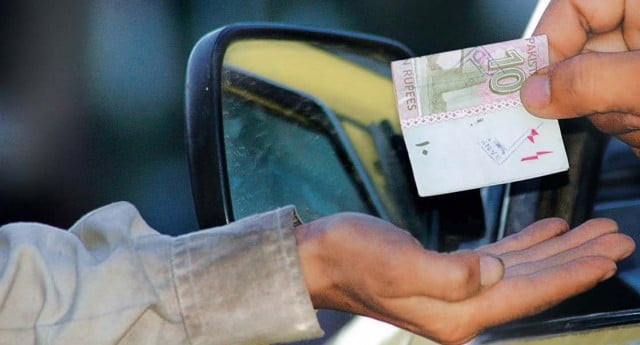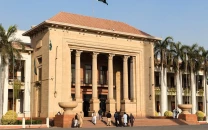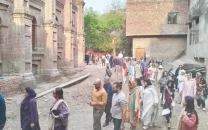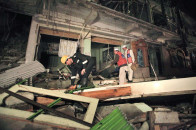Begging for a solution: Crackdown against beggary proves counterproductive
TMAs arresting hundreds of beggars, see more replacing them everyday.

Tehsil municipal administrations (TMAs) in Sialkot, Faisalabad and Multan have launched a new operation against beggary in the districts. TMA officials recently began apprehending all male beggars and handed dozens of beggars over to police officials.
On Monday, over 200 beggars clashed with police officials in Faisalabad and threw stones and bricks at the Civil Lines Police station. “They can’t just round us up like we are criminals. Since when has begging become a crime in Pakistan?” said Faisalabad resident Malik Khawar. “We will stop begging the moment our government stops begging from the IMF and other foreign countries,” he added.
District officials said that they were facing severe problems in trying to rid the districts of beggary. “Every time we clear them off the streets they return the next day. When we began targeting the men, we saw an influx of women to replace them,” said Faisalabad TMA official Raza Qadri. “The government is right to finally take notice of this menace but we cannot curb this menace by haphazardly removing people off the streets. We need a coordinated campaign in every district and the police needs to be involved,” said TMA official Sadiq, in Multan.
TMA officials in Sialkot, Faisalabad and Multan have already conducted a brief survey that has indicated that the greatest concentration of beggars is found at road intersections, grounds and shopping areas in every district.
“There are areas where women are predominant and one usually views children at traffic intersections. The men are usually seen begging in parks,” said TMA official Qadri. Qadri said that so far the campaign was proving counterproductive. “It is a very good idea in principle but it isn’t working in practice. The more people we take off the streets the more end up replacing them. We need legislation in this regard,” he said.
“They beat up my husband and handed him to the police for asking for alms. The next day my entire family went to his spot to ask for alms. If poor people can’t beg in Pakistan then where do they expect us to go?” said Razia, adding “Our government has no problems begging but we are starving and they want us to pretend we are living in France!”
Several commuters in the districts said that they fully supported the district government’s operation against beggary. “I don’t care how long it takes but we need this to happen. These people have become more and more belligerent. Now they don’t take anything less than Rs10 and once I paid a woman in coins and she threw them in my face and began swearing at me in the street,” said a commuter in Sialkot, Abdullah Hashmi.
Faisalabad administration officials said that despite the intensive drive against professional beggars in the district they were unable to curb the practice.
“We have taken hundreds of beggars into custody but they are always released a few days later. There are no institutions or rehabilitation facilities for these people so they return to the streets,” an official said.
The Social Welfare Department in Faisalabad recently rounded up over 300 professional beggars, including women and children but they were allowed to roam in the markets a few days later. “We did manage to send the children to the Child Protection Bureau (CPB) because the legislation as well as the facility to rehabilitate children allows us to take action but it is much harder to do the same for adults,” said Welfare Department official Rahmat Javed.
“They seem to think they can pick us up and hold us for a day and then we won’t return to the streets. We still don’t have any money and we still have no jobs so we have to return to the streets,” said a beggar in Multan, Aslam.
“They kept me for a day and then let me go. When they asked me if I would return to the streets I told them I would,” Faisal said. “I asked him why and he said ‘I didn’t win the lottery while I was in lock up, did I?” said Saad Khan, a welfare department official in Faisalabad.
The Social Welfare Department chief Asad Kamran claimed that district authorities needed the cooperation of the general public to help identify baggers in their areas.
“Most of all we need people to stop giving them money so they are forced to search for work. The practice continues because they know they can get by without doing anything and begging,” he said.
Published in The Express Tribune, July 13th, 2011.



















COMMENTS
Comments are moderated and generally will be posted if they are on-topic and not abusive.
For more information, please see our Comments FAQ